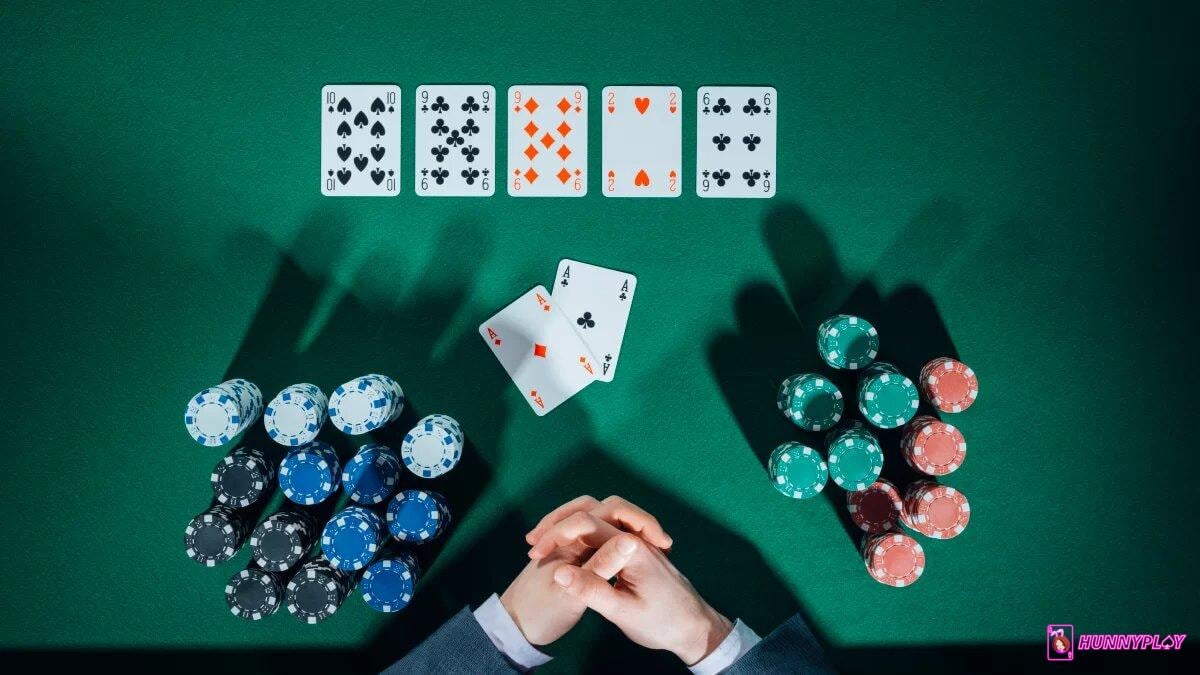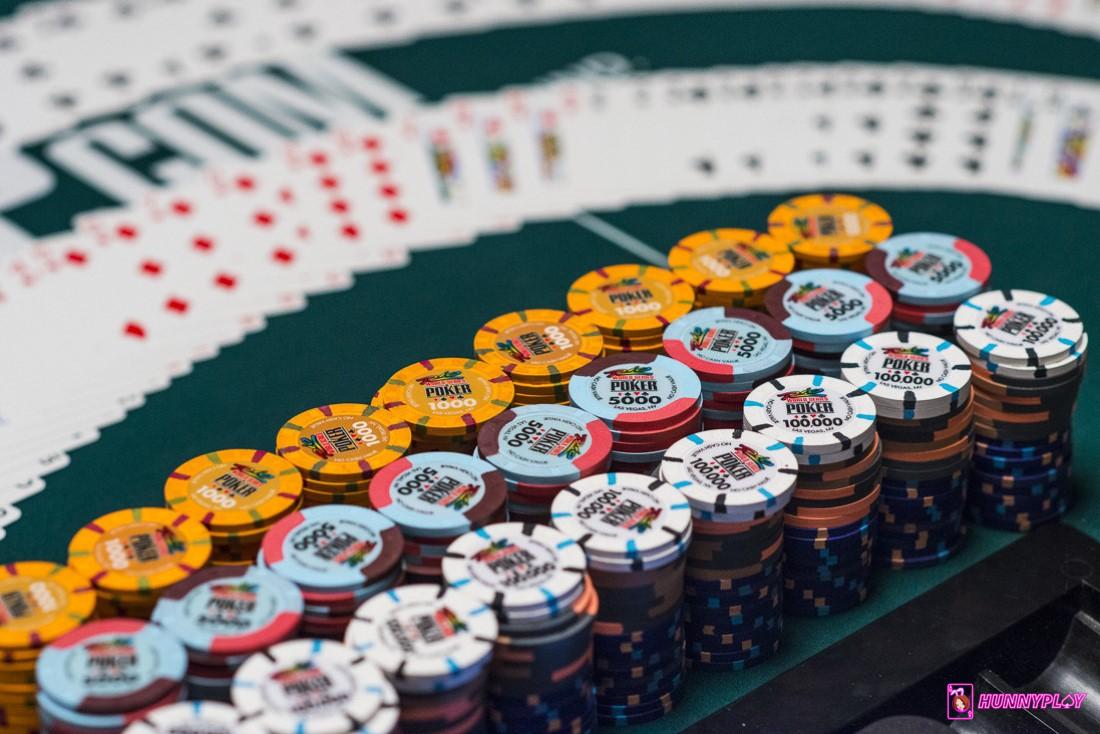Poker Cash Game presents a unique challenge where chips represent real money. In this article, HunnyPlay will explore intriguing facts, concepts, and Poker Cash Game strategy to help you succeed. Let’s plunge in and reveal the keys to mastering this game!
What is a Poker Cash Game?
In the world of Poker, cash games are a beloved format where players can join and leave the table at any time, using real money.
In Poker Cash Game, chips represent real money. Your chip stack will fluctuate based on the hands you play and their outcomes. The primary objective is to maximize winnings and minimize losses during your session.
Unlike tournaments, Poker Cash Game lacks a predetermined start and end time, allowing you to enjoy the game at your own pace.
Cash games cater to various stakes and skill levels, making them appealing to both casual and experienced players. Understanding the rules and having a solid strategy is essential for success in these games.

Poker Cash Game, where players can join and leave the table at any time using real money. (Source: Internet)
Fundamental concepts in Poker Cash Game
Mastering the fundamental concepts of Poker Cash Game strategy is essential for any player looking to succeed at the tables. Understanding and leveraging these concepts can significantly enhance your gameplay and boost your winnings.
Position
Grasping your spot at the Poker table is vital for making smart choices. The later your position, the more intel you gather about your opponents’ moves. Acting last in the betting round (being on the button) provides a strategic advantage, while acting first (being in the small blind) is less desirable.
- Early spots: Small blind, big blind, under the gun (UTG).
- Middle spots: MP1, MP2, MP3.
- Late spots: Cut off (CO), Button (BTN).
Hand rankings
Understanding Poker Hand rankings is crucial to assess your hand’s strength. The top-ranking hand is a royal flush, and the lowest is a high card. Remember, hands with more connections, such as straights, flushes, and full houses, have higher value than combinations of pairs or three of a kind.
- Royal Flush
- Straight Flush
- Four of a Kind
- Full House
- Flush
- Straight
- Three of a Kind
- Two Pair
- One Pair
- High Card
By mastering these rankings, you can better assess your hand’s strength and make more informed decisions during the game. This knowledge is fundamental for any serious Poker player aiming to excel in Poker Cash Game.
Aggression
Aggression in Poker means proactively making bets and raises, putting pressure on your opponents and increasing your win rate. Balancing aggression with solid hand selection and keen reads on your opponents is crucial. Aggressive play can force weaker hands to fold, accumulate larger pots when you have strong hands, and keep your opponents guessing.
- Bold moves: Bets (preflop or postflop), raises (preflop or postflop)
- Advantages: Fold equity, pot control, superior hand reading
Bankroll management
Bankroll management involves managing your Poker funds to ensure you’re playing within your means and can handle losing streaks. This practice protects your bankroll from significant losses and helps you remain in the game long-term. Stick to certain stakes based on your bankroll size and modify them according to your current win rate and risk tolerance.
- Bankroll size: Money reserved for Poker
- Stakes: Cash game blinds and buy-ins
- Rule of thumb: 20-50 buy-ins for the stakes you’re playing

Bankroll management is a significant skill in Poker Cash Game strategy. (Source: Internet)
Poker Cash Game strategy
Developing a solid poker cash game strategy is essential for any player aiming for long-term success. One of the key elements of this strategy is selecting the right starting hands.
Starting Hands
Choosing the right starting hands is vital for a winning Poker Cash Game strategy. Prioritize playing premium hands like big pocket pairs (AA, KK, QQ) and big suited connectors (AKs, AQs).
These hands reduce the risk of tough situations and maximize value from strong hands.
However, you can expand your range from later positions, taking into account factors such as your table image, stack size, and opponents’ tendencies. This flexibility allows you to exploit weaker players and adapt to different game dynamics.
By focusing on premium starting hands and adjusting your range based on position and game conditions, you can enhance your cash game performance and increase your chances of success at the tables.
Preflop strategy
Mastering preflop in Poker Cash Game strategy is crucial for setting up profitable postflop scenarios. Key points to ponder:
- Playing tight from early positions ensures you have a strong hand when entering the pot, allowing you to leverage positional advantage on later streets.
In late positions, you can incorporate more speculative hands due to the informational advantage you have over your opponents.
- Be mindful of the blinds when determining your preflop strategy. Isolating or attacking weak players in the blinds can help you generate more profit, as these players are often forced to play with weaker hands.
- Employ correct bet-sizing methods to build a pot or force folds from opponents.
For example, using a standard raise size of 2.5-3x the big blind when opening the pot can help you control the action and extract value from your strong hands.
By focusing on these aspects of preflop strategy, you can create favorable situations for yourself postflop, leading to increased profitability in your Poker Cash Game sessions.
Postflop strategy
Mastering postflop play is essential for a successful Poker Cash Game strategy, as it involves more complex decision-making. Here are some key tips to enhance your postflop play:
- Continuation betting: When you’re the preflop aggressor, a well-timed continuation bet (c-bet) can help you take down pots by representing strength.
Modify your c-bet frequency and size based on factors like board texture and opponents’ tendencies.
- Value betting: Extract value from strong hands by aiming at weaker hands in opponents’ ranges.
- Pot control: Manage pot size with medium-strength hands, avoiding big commitments when unsure. This helps in minimizing losses and controlling the game’s pace.
- Turn and river play: Navigate difficult turn and river choices by assessing hand strength relative to opponents’ ranges and changing board texture.
This evaluation is crucial for making informed bets, calls, or folds.
By focusing on these aspects of postflop play, you can make more informed decisions and increase your profitability in Poker Cash Game.
Bluffing
Bluffing is a powerful tool in Poker Cash Game strategy when used effectively. To enhance your bluffing strategy:
- Opt for favorable bluffing situations, like having blocker cards, opponents showing weakness, or the board likely missing their range.
- Alter your bet sizes to create uncertainty in opponents, preventing easy adjustment to your bluffs.
- Factor in your table image and history with opponents when planning bluffs, as these influence bluff success.
- Beware of tilt and avoid emotional decisions when bluffing, as this leads to suboptimal play and costly errors.
By incorporating these bluffing Poker Cash Game strategy into your cash game play, you can create a more unpredictable and effective approach, keeping your opponents on their toes and increasing your overall success.

Bluffing is a powerful tool in Poker Cash Game. (Source: Internet)
The way to exploit opponents in Poker Cash Game
In Poker Cash Game strategy, exploiting your opponents can give you a significant edge. By spotting their weaknesses and tweaking your strategy, you can boost your win rate. This section covers exploiting opponents, including targeting weaker players, isolating them, and adapting to different player types.
Weaknesses
Every player has exploitable weaknesses. Here are a few common ones:
- Overplaying weak hands: Here, a player may overvalue a weak hand, resulting in large bets and lost pots.
- Folding too often: Players who fold frequently are tight, lacking confidence, letting you take small pots without resistance.
- Too aggressive: Overly aggressive players tend to place big bets and make large raises. Watch for these tendencies; they may offer chances to trap them with strong hands.
- Too passive: Passive players seldom raise or play aggressively, becoming easy prey for those who control the table.
Adjusting to player types
To exploit your opponents, it’s crucial to adjust your strategy based on the player types you’re facing. Common player types include:
- Tight players: These players usually play only strong starting hands and fold easily. Exploit them by stealing blinds and pots with a more aggressive betting style.
- Loose players: These players play a wide range of hands, even weak ones. Take advantage of their loose tendencies by playing tighter and using their impatience against them.
- Aggressive players: These players frequently bet and raise, putting pressure on their opponents. Counter their aggression by trapping with strong hands or re-raising with premium holdings.
- Passive players: These players rarely bet or raise, mainly calling and checking. Exploit their passiveness by controlling pot size and applying pressure with well-timed bets or bluffs.
Isolating weaker players
One key aspect of exploiting opponents in Poker Cash Game strategy is isolating weaker players. This often involves targeting those with looser tendencies or weaker hands and playing pots only with them. Isolation techniques include:
- Raising or re-raising: When a weak player enters the pot, raise or re-raise to deter others and narrow the field.
- Position awareness: Know your position relative to the weak player; having position on them offers a significant advantage in controlling pot size and applying pressure.
- Applying calculated pressure: Weaker players fold under pressure, so use well-timed betting and raising with strong hands and bluffs to make them uncomfortable.
Poker Tournament vs. Poker Cash Game strategy
Understanding the differences between tournament and Poker Cash Game strategy is essential for any poker player looking to excel in both formats. Each requires a distinct approach to maximize success.
Differences Tournament vs Cash Game
Although both formats share the same core rules, there are significant strategic differences between cash games and tournament poker.
In Poker Cash Game strategy, the focus is on maximizing profit in every situation over the long term. Conversely, tournament poker demands a combination of solid strategies, risk management, and constant adaptation to changing conditions.
One key difference is the ability to rebuy. In cash games, players can rebuy at any time if they lose their chips, allowing for a more aggressive play style.
In contrast, tournaments have a fixed buy-in with limited or no rebuy options, necessitating a more cautious approach to risk-taking.
In multi-table tournaments (MTTs), the blind structure increases progressively, forcing players to adjust their strategies as the tournament advances.
Poker Cash Game strategy, however, have a fixed blind structure, making the game less variable and more consistent over time.
Developing a balanced approach
A balanced approach to Poker Cash Game strategy is essential for success, whether in cash games or tournaments. Implementing key principles can help maintain a strong game in both settings.
- Tight-aggressive play: Adopting a tight-aggressive playing style is crucial for both formats.
This involves being selective with starting hands and aggressive when entering a pot. This approach minimizes potential losses and builds a stable foundation for your game.
- Risk assessment: In tournaments, weighing the risks and rewards of each move is critical due to limited rebuys.
Cash game players can afford more risks, given the option to rebuy. However, assessing risks in cash games is still important to avoid continuous losses.
- Position awareness: Position is vital in both formats. Playing more hands in late positions and being conservative in early positions allows you to gather information about your opponents and make better decisions.
- Adaptability: Tournament players must adjust their strategies as blind levels increase and the playing field narrows. Similarly, cash game players need to adapt to new opponents and varying chip stack sizes during a session.
By understanding and applying these principles, you can build a solid foundation to succeed in both Tournaments and Poker Cash Game strategy.
Remember to stay confident, knowledgeable, and clear in your decision-making, always adjusting your strategies according to the specific game and opponents.
 Poker Tournament and Poker Cash Game have many significant differences. (Source: 888Poker)
Poker Tournament and Poker Cash Game have many significant differences. (Source: 888Poker)
Tips for success with Poker Cash Game strategy
Achieving success in Poker Cash Game requires understanding and mastering several key factors. Here, we will explore table selection, managing tilt, and the balance between Game Theory Optimal (GTO) and exploitative play.
Table selection
Selecting the right table is crucial for success in Poker Cash Game. You should seek out tables with players who exhibit weaknesses or play sub-optimally, which can significantly improve your chances of winning. Consider these factors:
- Player skill level: Look for tables with less-skilled opponents to increase your edge.
- Seat availability: Position matters; choose tables where you can sit to the left of weaker players for an advantage.
- Game variation and stakes: Select games and stakes you are comfortable with and have experience in.
Managing tilt
Tilt is the emotional state resulting from a player’s negative emotions or frustration, leading to poor decisions and costly mistakes. To effectively manage tilt, follow these Poker Cash Game tips:
- Recognize the signs: Identify indicators that you may be on tilt, such as an increased heart rate or a desire to chase losses.
- Take a break: Step away from the table to regroup and calm down.
- Stay objective: Focus on logical decisions, not emotions.
- Avoid distractions: Eliminate external factors that might be causing tilt, such as disruptions or a lack of focus.
Poker Cash Game strategy – FAQs
Q: How do you beat the cash game?
A: Employ these strategies to improve your cash game performance:
- Bluff-catch with medium-strength hands.
- Mostly bet when you hit a strong hand.
- Bluff on the flop with backdoor draws.
- 3-bet your premium hands (QQ+, AK).
- Check on the flop frequently in multiway pots.
- Bet frequently when heads-up and in position.
Q: When should you leave a cash game?
A: In a cash game, players can leave the table at any time without any etiquette obligations.
However, it’s important to be mindful of the game’s dynamic and how your departure might impact other players. Leaving strategically can help maintain a positive table atmosphere.
Q: How do you dominate low stakes cash games?
A: To excel in low stakes games, focus on playing tight and value betting your strong hands.
Value betting means betting or raising when your hand is comfortably ahead of your opponent’s calling range. Essentially, you believe you have the best hand and want to extract value from weaker hands.

Poker Cash Games can offer very attractive rewards to players. (Source: Internet)
Conclusion
To summarize, mastering Poker Cash Game strategy involves strategic thinking, adaptability, and keen observation.
Focus on selecting the right table, managing tilt, and balancing GTO with exploitative play to improve your performance. Knowing when to leave the table is also crucial.
For more expert tips and strategies, visit HunnyPlay and elevate your poker experience. Join us and start winning today!




















